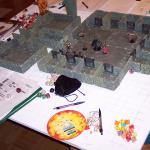
Source: Flickr user Pedro Ribeiro Simões
License: Creative Commons
My distaste for director Ari Aster’s movies is, if not well known (because who would care?), at least unhidden. I thought Hereditary (2018) was sub-par but inoffensive. Midsommar (2019) made me apoplectic, most likely because I have poor self-control and because it’s a bad movie. I haven’t seen Beau is Afraid (2023), but both the title and Eileen Jones’ review make it unlikely I’ll spend 3.5 hours of my life on Joaquin Phoenix screaming at his dad’s penis or whatever that one’s about.
But this is a movie review, not an afterschool beatdown. What interests me is why I’ve struggled so much with Aster’s oeuvre. And wouldn’t you know it—eureka—I think I’ve got it: Atom Egoyan. I don’t mean the man himself. I mean the way he makes movies. He seems, as best I can glimpse it, to take exactly the opposite approach to filmmaking Aster does. His phenomenal thriller (and Bob Haskins—R.I.P.—vehicle), Felicia’s Journey (1999), makes a convincing case study.
The film’s narrative could easily be movie-of-the-week fodder. A naïve Irish girl named Felicia (Elaine Cassidy) falls head-over-clogs for a local boy, Johnny (Peter McDonald). He goes off to the UK to seek work, leaving her, she soon learns, with a wee lad or lass developing in utero. Even worse, her father (Gerard McSorley) hears the boy’s actually gone to join the British army, and, as a rabid Irish nationalist whose grandfather died in the Easter Rising of 1916, accuses Felicia of having the enemy inside her. She sets off to England to find Johnny and prove her dad wrong. Poor, innocent, and unprepared, she’s quickly aided in her quest by Joe Hilditch (Bob Hoskins), an English kitchen manager at a factory.
Heartwarming, no? The problem is that Hilditch is, er, “a proper weirdo.” One room of his house is completely full of boxes and boxes of the same kitchen appliance. Every night he watches tapes of an old TV show, following each step as the French chef and host guides him through the recipe. We watch as he eats meager bits of elegant feasts, still watching as the woman slurps and smiles. Her jouissance elicits little but a blank stare from ole Joe Hilditch.
Egoyan, however, refuses to make this a horror film either. Instead, he uses the movie’s form to direct and manage the viewer’s investment and understanding. Our two main characters are not, at first, related in any way. We have no idea who they even are, as Felicia gawks confusedly at a border guard, saying she has no identification. Holditch marches around a factory, critiquing his staff’s cooking and bringing a sample lunch out to the foreman. She calmly blunders around asking after “Johnny” and “the lawnmower factory.” He goes home and trusses a turkey in a kitchen many times too big for a single man with no company. Flashbacks fill us in, but in ways that obfuscate as much as they reveal (at least at first). What has rural Ireland to do with Birmingham?
The camera work (and the phenomenal performances of Cassidy and Hoskins) carry us through a movie that, at first, seems inscrutable. After meeting Felicia, Hoskins watches her walk away in a rearview mirror, a small frame beaten back by a mess of grass and inhuman highways. His voyeurism is creepy, but not unimaginable. He never cackles or says some too-precious line, dripping in double entendre. Something is off but what? And for whom?
When I watched Hereditary and especially Midsommar I got the opposite impression. Every single moment reflected some (already obvious) theme (inevitably one related to trauma). The characters did what they did, wore what they wore, and spoke what they spoke as if to beg me to get the point. Above all, I was reminded of a certain kind of student paper, not the worst, most disorganized one one can get, but the sort that a student produces before they fully grasp that writing is more than the repetition of a formula (and that can take a long time, as it did for me). These papers don’t just include a thesis statement and topic sentences; they make sure every other sentence studiously reminds you of that thesis and those topic sentences. Often a dependent clause will ring out after each piece of evidence, asserting what the evidence shows or demonstrates, masking any real justification with a smartly placed comma. When a student does it, I feel moved to respond graciously. When Ari Aster does it, it’s like being trapped in a waiting room, “Fortunate Son” blaring, as Gilbert Lowe (Anthony Edwards) from Revenge of the Nerds (1984) nudges you over and over, mawkishly and excitedly stammering “YOU KNOW THIS IS ABOUT VIETNAM?”
Egoyan does no such thing in Felicia’s Journey. He understands that the connections are there for the viewer to draw, using suspense as a way to keep us interested, even as we might be confused or thematically adrift. God. To see that kind of subtlety, never mind concern with the complex realities of human suffering and vivacity, from Aster. But now I’m grouching. I think I’ll go re-watch Exotica (1994).













